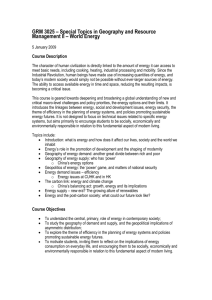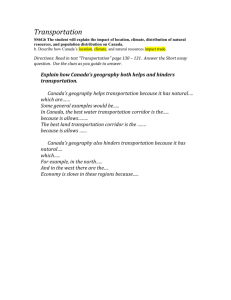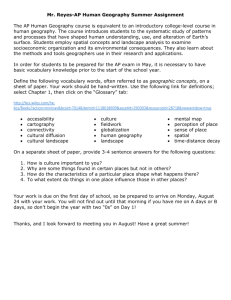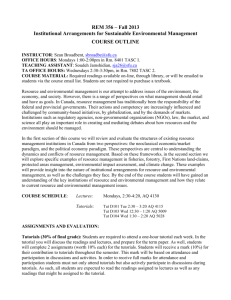Course Outline - Geography, Department of
advertisement
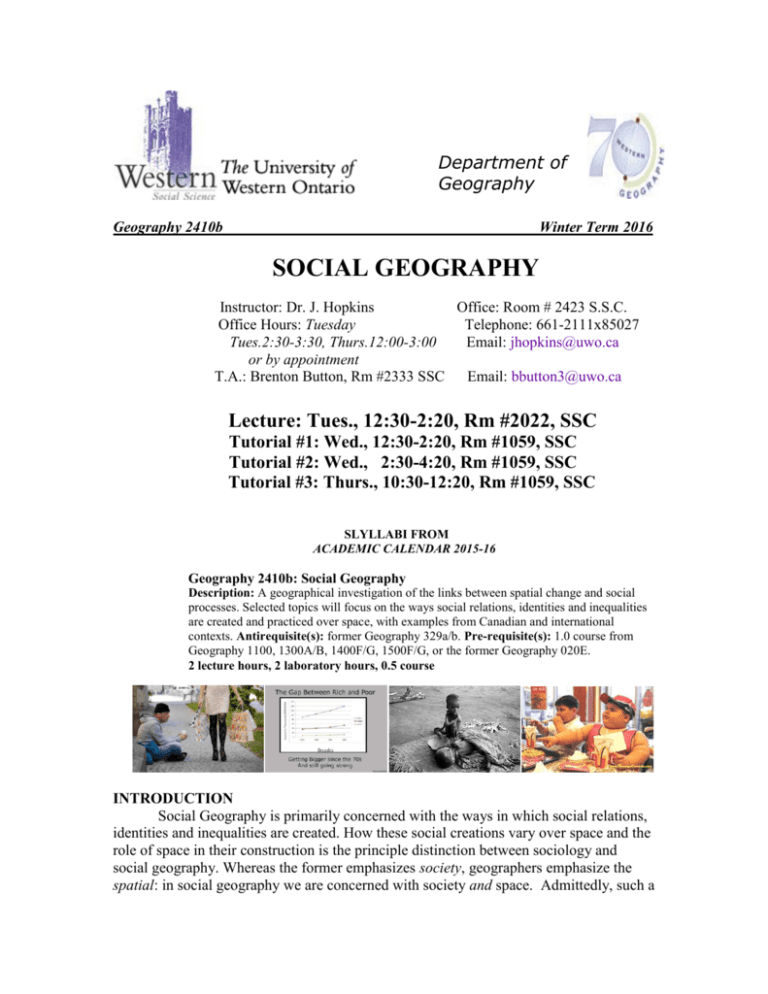
Department of Geography Geography 2410b Winter Term 2016 SOCIAL GEOGRAPHY Instructor: Dr. J. Hopkins Office: Room # 2423 S.S.C. Office Hours: Tuesday Telephone: 661-2111x85027 Tues.2:30-3:30, Thurs.12:00-3:00 Email: jhopkins@uwo.ca or by appointment T.A.: Brenton Button, Rm #2333 SSC Email: bbutton3@uwo.ca Lecture: Tues., 12:30-2:20, Rm #2022, SSC Tutorial #1: Wed., 12:30-2:20, Rm #1059, SSC Tutorial #2: Wed., 2:30-4:20, Rm #1059, SSC Tutorial #3: Thurs., 10:30-12:20, Rm #1059, SSC SLYLLABI FROM ACADEMIC CALENDAR 2015-16 Geography 2410b: Social Geography Description: A geographical investigation of the links between spatial change and social processes. Selected topics will focus on the ways social relations, identities and inequalities are created and practiced over space, with examples from Canadian and international contexts. Antirequisite(s): former Geography 329a/b. Pre-requisite(s): 1.0 course from Geography 1100, 1300A/B, 1400F/G, 1500F/G, or the former Geography 020E. 2 lecture hours, 2 laboratory hours, 0.5 course INTRODUCTION Social Geography is primarily concerned with the ways in which social relations, identities and inequalities are created. How these social creations vary over space and the role of space in their construction is the principle distinction between sociology and social geography. Whereas the former emphasizes society, geographers emphasize the spatial: in social geography we are concerned with society and space. Admittedly, such a concern is central to the larger body of work we simply call human geography. Traditionally ‘human geography’ is comprised of several spheres: economic geography, political geography, cultural geography, and social geography. As geography students, you will come to appreciate that these boundaries are artificial and far from mutually exclusive. Each of these sub-fields share subject matter, theories and methods. Such ‘subdiscipline’ labels are useful, however, because they help to identify particular approaches and topics for study and analysis. This course will draw upon the political, the economic, and the cultural fields of geography, but the emphasis will remain upon the social issues affecting people’s lives—class, ‘race’/ethnicity, gender, poverty, the body, health and well-being—and the role of space in the creation of social inequality and oppression, with particular emphasis on the Canadian context. A word of caution: This is not a web-based, ‘distance’ course: we meet in real time in real space. This course is ‘retro’ in presentation: there is no website containing course lecture notes for you to access before or after class! You will have to physically attend the classroom, listen, and take notes during the actual lectures. If you miss a lecture, you may ask a fellow classmate for his or her notes. If you miss something during a lecture, please raise your hand and seek clarification from the instructor. OBJECTIVES This course has four primary objectives: (1) to identity several contemporary social inequalities from geographical perspectives; (2) to explain and critique the economic, political and cultural processes creating and sustaining social and spatial inequalities; (3) to promote an awareness of social inequalities affecting the everyday geographies of people; and (4) to provide both a vehicle and a forum for you to improve your oral, verbal and critical thinking skills. The first three objectives will be achieved through the course lectures, films and readings. The fourth objective will be pursued through class discussions, and in particular, though the ‘micro-lecture’ assignment in the weekly tutorials (see Tutorials and Tutorial Assignment below). Fulfilling these course objectives will contribute directly to several learning objectives of the UWO Geography Undergraduate Programs, specifically the following: Knowledge about the fundamental characteristics of, and processes operating in, social systems Awareness of geographical diversity through knowledge of different places and understanding of the processes that shape them Appreciation of the epistemological and historical foundations of Geography as a discipline Ability to identify, analyze and interpret spatial patterns and relationships in social and systems Ability to apply geographical concepts, skills and understanding to real-world problems and in a variety of careers and occupations Generic skills of critical thinking, independent research, teamwork, and oral and written communication By the end of this course, you should be able to better identify and critique social inequalities from a geographical perspective, understand the role space places in constructing and explaining these inequalities, gain an appreciation for the breadth of social geography, and have both exercised and improved your oral, verbal skills, and critical thinking skills. 2 COURSE CONTENT The following is a general outline of the topics that will, more or less, be addressed. Several films and media bytes will enrich these classes. Lectures will not be a verbalization of the text book; rather they will borrow from and then build upon the readings and a variety of other sources. You must attend all of the lectures, participate in the tutorials, do the assigned readings, and follow—if not actively participate in—the class discussions in order to successfully complete the examinations and oral presentation assignment. Attend all of the lectures and tutorials, take lecture notes, do all of the readings, apply yourself to the tutorial assignment, study for the examinations, and it is highly probable that you will pass the course, most likely with a ‘B’ or better. Lecture Topics Dates 1. Social Geographies: Society & Space Tues., 5 Jan. 2. Class & Inequality in Canada Tues., 12 Jan. 3. Places of Leisure and Consumption Tues., 19 Jan. 4. ‘Community’ as Site of Identity & Struggle Tues., 26 Jan. 5. ‘Race’, Ethnicity and Immigration in Canada Tues., 2 Feb. 6. Geographies of Gender Tues., 9 Feb. * Conference Week: No Classes Tues., 16 Feb. * Mid-Term Examination Tues., 23 Feb. 7. Bodies and Sexualities Tues., 1 Mar. 8. Age and Disabilities Tues., 8 Mar. 9. Nature and Society Tues., 15 Mar. 10. Homelessness Tues., 22 Mar. 11. Crime and Deviance Tues., 29 Mar. 12. Poverty, Inequality and Social Justice Tues., 5 Apr. ___________________________________________________________ TUTORIALS AND TUTORIAL ASSIGNMENT The tutorials are intended to allow you to practice your oral presentation skills while enriching the amount and type of information you receive about social geography and its many issues. You will each be required to lead a 15 minute ‘geography microlecture’ on a relevant social geographical issue. Given the class enrolment, we will conduct four or five presentations per tutorial over the nine scheduled tutorial sessions: two prior to Conference Week and seven thereafter, depending upon the number of students in the course. The actual number of tutorials you need attend is dependent upon the number of students in your particular section. You and your Teaching Assistant will identify the number and dates of your tutorials early in the term. During the first tutorial, held during the second week of term, the Teaching Assistant and course instructor will distribute, explain and answer all questions about the assignment. You will each select a time slot at that first tutorial. Between now and then, review your other course outlines, including your social and employment calendars, and decide which two or three tutorial dates best suit your schedule. We will try to accommodate your first or second choice. Once you have selected a presentation date, 3 you are wedded to that date, barring exceptional, justified and well-documented circumstances (i.e. death and other such catastrophes). Each presentation will be evaluated by the Teaching Assistant and is worth 30% of your final course mark. Your attendance is mandatory at these tutorials and is worth 5% of your final course grade. Perfect or near perfect attendance will earn you the full 5%. You will lose marks for your absences at the following rate: One Absence: 0% (We all deserve a break) Second Absence: 2% (Stings but not too painful) Third Absence: 5% (This hurts: ouch!) Fourth Absence: 10% (OMG: you’ve lost an entire letter grade!) Fifth Absence: 15% (Cripples your overall course average….) Sixth Absence: 25% (Really? Why are you at university?) Seventh Absence: -- (Withdraw from course or accept an ‘F’) Again, perfect attendance or near perfect attendance will earn you the full 5%. More importantly, please attend to support your peers. Missing my lectures is totally optional— silly—but it is an option….I do not take attendance at the lectures. Tutorial Schedule 1. 2. 3. 4. 5. 6. * Week of Jan. 4th No Tutorials Week of Jan. 11th Tutorials Introduce Micro-Lecture Assignment Week of Jan. 18th Tutorials (Weldon Library) ‘Accessing Information’ Session Week of Jan. 25th No Tutorials Week of Feb. 1st Tutorials th Week of Feb. 8 Tutorials * Conference Week: No Classes week of 15th Feb. * Mid-Term Examination Week: no tutorials week of 22nd Feb. 7. 8. 9. 10. 11. 12. Week of Feb. 29th Week of Mar. 7th Week of Mar. 14th Week of Mar. 21st Week of Mar. 28th Week of Apr. 4th Tutorial Tutorials Tutorials Tutorials Tutorials No Tutorials * The number of tutorials may vary and/or change weeks at the Instructor’s discretion. _______________________________________________ 4 TEXT BOOK AND ADDITIONAL READINGS Pain, R. (et al.) (2001). Introducing Social Geographies. New York: Oxford University. (Book store: approximately $75.00 plus tax) Northey, M., and D.B. Knight (2007). Making Sense : A Student's Guide to Research and Writing : Geography & Environmental Sciences, 3rd ed. Toronto, Ont. ; Oxford : Oxford University Press. [Weldon Reserves G70.N67 2007] You are required to read the above social geography text book and strongly encourage to read sections of the guide book. There is one copy of both books placed in the Heavy Reserve section of D.B. Weldon Library (2-hour reserve). Copies of the text book are available for purchase in the bookstore. The reading schedule is quite simple: there are twelve chapters and twelve lectures, so please read one chapter each week, starting with Chapter #1. Strive to read the week’s chapter prior to attending the lecture, to better facilitate any class discussions that may arise. To assist you with taking notes in this class and your ‘micro-lecture’ presentation, you are strongly encouraged to read Chapter #3: Writing and Reading Lecture Notes (pp.52-60), and Chapter #7: Writing and Visual Aids for Presentations (pp. 93-107) of the Northey and Knight book. Other readings may be assigned by the instructor as the course unfolds or possibly as part of the ‘micro-lectures’ by your peers. EVALUATION Assignment ____ Mid-term exam Tutorial ‘Micro-Lecture’ Tutorial Attendance Final Examination Weight 30 % 30 % 5% 35 % Date . Tuesday, 23rd February To be arranged Weekly tutorial T.B.A. April 9th-30th Your evaluation is based primarily on your ability to fulfill the primary objectives of the course as evidenced in the examinations and the tutorial assignment. Your final standing in the course is based upon your marks in those exercises. The precise format of the examinations will be explained well in advance of their sitting. Be aware that testable material may include any and all aspects of the course: lectures, readings, films, tutorials and discussions. Exams are likely to be comprised of a mixed format: multiple choice, true/false, and possibly fill-in-the blank(s), short answer(s), and/or essay questions(s). GRADES I regard the mark of ‘C’ (60%-69%) indicative of low average to slightly below average work, both competent and acceptable. You have likely completed all of the assignments and readings and demonstrated a general understanding of the course material as evidenced in the examinations and tutorials. A grade of ‘B’ (70%-79%) reflects evidence of an average to a high average to a slightly above average 5 performance. Not only have you fulfilled the assignments in a more meticulous fashion, you have demonstrated a more thorough understanding of the material and gone a few extra steps beyond the average student as evidenced in the evaluated exercises. An ‘A’ (80%-89%) is reserved for well above average to excellent effort and achievement. Exceptional diligence, a thorough knowledge of the course material, and the ability to apply and convey concepts in an effective, logical and literate fashion are clearly evident. Hard labour and exceptional effort are necessary but not, by themselves, sufficient to warrant an ‘A.’ An ‘A+’ (90 %+) is rare but is certainly possible. An exceptionally outstanding performance on the examinations, and a micro-lecture demonstrating a superb command of English and a critical mind capable of synthesizing complex facts and ideas to arrive at particularly astute conclusions, will earn this prestigious grade. As noted above, if you attend all of the lectures and tutorials, take lecture notes, do all of the readings, apply yourself to the tutorial assignment, and study for the examinations, it is highly probable that you will pass the course, most likely with a ‘B’ or better. To be clear: you must achieve a minimum 50% or better final course grade in order to pass this course. ASSORTED ADMINISTRIVA… Lecture Notes Note taking, like reading, form the foundation of communication, critical thinking, and decision making. If you write information down by hand, retention is heightened relative to passive observation. Consequently, this course may seem ‘retro’ by design: there is no website containing course lecture notes for you to access before or after class! Imagine! You will have to physically attend the lectures, listen, participate, and take your own notes. If you miss a lecture, ask a fellow classmate for his or her notes. If you miss something during a lecture, please raise your hand and seek clarification from the instructor. Safety Safety is a shared responsibility. Although I will take every reasonable precaution concerning the safety of you as a participant in this course, the potential hazards of urban life make it imperative that everyone behaves responsibly in order to reduce the risk of accidents. Personal safety must be a personal responsibility. Complacency, inattention, lack of preparation and/or training will all increase risks to health and safety. Ultimately each individual must act in a reasonable manner in order to ensure their safety and the safety of others. (For more information, please see our departmental web address on ‘Health and Safety’: http://geography.ssc.uwo.ca/health-safety/fieldwork.htm ). Prerequisite checking - the student’s responsibility If applicable, a list of the prerequisites for the course and the following notation regarding the Senate regulation with respect to the student’s responsibility for ensuring 6 that course prerequisites have been completed successfully or special permission from the Dean obtained. Unless you have either the requisites for this course or written special permission from your Dean to enroll in it, you may be removed from this course and it will be deleted from your record. This decision may not be appealed. You will receive no adjustment to your fees in the event that you are dropped from a course for failing to have the necessary prerequisites. Appeals You are advised to read the course calendar to familiarize yourself with Western's regulations and procedures concerning appeals, grades, regulations, penalties and such at http://www.uwo.ca/univsec/pdf/academic_policies/appeals/appealsundergrad.pdf Requests to have an assignment or examination re-evaluated must be submitted to the Teaching Assistant (labs) or me (exams) in writing within one week of receiving the graded assignment. In this written request for re-appraisal the specifics of what you would like re-visited and the justification for doing so will be clearly and concisely stated. Should you feel that your final grade in the course is biased, inaccurate or unfair, you do have the right to appeal your mark. Please refer to the Western Calendar prior to doing so (see web site above). In an attempt to avoid such time-consuming and stressful procedures for us both, be assured that each and every piece of work is graded carefully and thoroughly. I stand by the marks assigned by me and my Teaching Assistants. Be aware that marks may be raised--as well as lowered--through an appeal process. Alternate Examination Dates, Dropping the Course The date of the final examination is set by the Office of the Registrar and will not be changed. If you consider that you have grounds to write a final examination on an alternate date, you must follow the procedure established by the Dean’s Office and complete the appropriate forms. The same holds for dropping the course Medical or Non-Medical Absence, Exemption and Tardiness Students who have documented ‘special needs’ and/or official notifications of accommodation from the Dean’s office —emailed directly to me—will be accommodated accordingly, including exemption of exams and assignments if circumstances warrant. For either medical or non-medical academic accommodation, such documentation must be submitted by the student directly to the appropriate Faculty Dean`s office and not to the instructor. It will be the Dean`s office that will determine if accommodation is warranted. In all other instances of absences, omissions and tardiness on your part, I respect your maturity: you are adults. If you choose to miss lectures, assignments and examinations you are most at liberty to do so. The consequences are made evident in this course outline. If you are late to class—or must leave early—please do so quietly with minimal disturbance to your peers. Thanks. For UWO Policy on Accommodation for Medical Illness and a downloadable SMC see: http://www.uwo.ca/univsec/pdf/academic_policies/appeals/accommodation_medical.pdf Downloadable Student Medical Certificate (SMC): http://www.uwo.ca/univsec/pdf/academic_policies/appeals/medicalform.pdf Plagiarism 7 Plagiarism is stealing: it is unacceptable, and those who tempt fate will be persecuted to the fullest extent allowed under the university’s regulations. Scholastic offences are taken seriously and students are directed to read the appropriate policy, specifically, the definition of what constitutes a Scholastic Offence, at the following web site: http://www.uwo.ca/univsec/pdf/academic_policies/appeals/scholastic_discipline_undergr ad.pdf. Please avoid this experience and do your own work. Be aware that all required papers may be subject to submission for textual similarity review to the commercial plagiarism detection software under license to the University for the detection of plagiarism. All papers submitted for such checking will be included as source documents in the reference database for the purpose of detecting plagiarism of papers subsequently submitted to the system. Use of the service is subject to the licensing agreement, currently between The University of Western Ontario and Turnitin.com (http://www.turnitin.com ). Extensions & Late Submissions Given the format and tight timeline schedule for the micro-lecture assignment, extensions and late submissions are not possible. The only way you might be able to switch your presentation date is if—and only if—another student in your own tutorial section is willing to switch dates with you AND you give the Teaching Assistant notice of this switch at least ten days before your scheduled presentation date. Electronic Devices Never record digitally (AV) or otherwise any part of my class lectures or labs without my prior and specific permission. No electronic devices are allowed during the examinations. Accessibility The University of Western Ontario is committed to achieving barrier free accessibility for persons studying at Western. Please contact the course instructor if you require material in an alternate format or if you require any other arrangements to make this course more accessible to you. You may also wish to contact Services for Students with Disabilities (SSD) at 661-2111 x 82147 for any specific question regarding an accommodation. Support Services Registrarial Services: http://www.registrar.uwo.ca/ Student Development Services: http://www.sdc.uwo.ca/ Mental Health: If you or someone you know is experiencing distress, there are several resources here at Western to assist you. Please visit the site below for more information on mental health resources: http://www.uwo.ca/uwocom/mentalhealth/. Codes of Conduct My experience with students has been 99.99% positive! Let us strive to keep that percentage, OK? I will be polite and courteous to you and your peers, and I demand the same from you. Not to belabour the point, but included below is the Code of Conduct for Students, Staff, and Faculty for the Department of Geography. The University of Western Ontario Code of Student Conduct is available: http://www.uwo.ca/univsec/pdf/academic_policies/appeals/code_of_conduct.pdf 8 Please familiarize yourself with both of these documents should you have concerns about your own or somebody else’s classroom behaviours. MUTUAL EXPECTATIONS You can expect me to come prepared for, and attend, all lectures regularly and punctually. I will strive to promote a collegial atmosphere of mutual respect conducive to the exchange of ideas and learning. I demand the same from you. Reading during a lecture, the disturbing consumption of food or drink, littering the classroom, the use of iPods, phones, recreational lab-top use, and other activities that may impede the ability of you or other students to learn are unacceptable behaviours. If we all abide by this code of civility and mutual respect, we set the stage for a mature, safe and stimulating intellectual forum. If you chose to contact me by phone or email, I will attempt to respond within 24 hours during weekdays: do not expect an instantaneous response. Thank you in advance for your patience. I rarely check or send emails on weekends. Please use proper English in your text mail. Communication, like politeness, is a two-way street, and I shall extend to you the same courtesies. Finally, if you have problems, questions, ideas or concerns with any aspect of the course, please raise the matter before, during or after class, or during my office hours. You can also phone me and email me (see paragraph above). I welcome your questions and constructive criticisms. I am approachable and want to assist you to succeed! CODE OF CONDUCT FOR STUDENTS, STAFF, AND FACULTY FOR THE DEPARTMENT OF GEOGRAPHY Affiliation with the Department of Geography presumes mutual respect among students, staff, teaching assistants, and faculty. A positive atmosphere of professionalism and collegiality is essential for everyone to perform to the best of his or her abilities. This requires respect for the opinions and questions of others and behaviour that is, at all times, courteous, and conducive to creating a pleasant and productive environment for learning and working. As members of a Department of Geography, we are expected to show special respect for our environment, being individually responsible for promoting a clean and safe work environment within the facilities of the Department and the Social Science Centre, including classrooms, laboratories, the Map Library, offices, hallways, washrooms, exterior grounds, and the facilities and vehicles used in field courses and field trips. It is inevitable that misunderstandings will occur from time to time. However, it is in everyone's interest to try and resolve problems in a non-confrontational manner. Threatening, violent, or abusive behaviour, harassment (including sexual and racial harassment), rudeness (in person, in writing, or on the telephone), and abuse of authority, for whatever reasons, corrode good working and learning conditions. Incidents that cannot be resolved amicably may be reported to the Chair of the Department (661-3653). The Chair will consider appropriate actions for resolving the problem, usually after consultation with the parties involved. If required, contact with university services (e.g., Police, Equity) or civil authorities will be invoked. Student Use of University Facilities and Classroom Decorum: Students are expected to comply with the authority of University staff and faculty on all matters relating to access to facilities (offices, classrooms, laboratories, and Map Library) and to use of equipment and resources. Students are expected to attend all lectures and laboratory sessions regularly and punctually. Instructors are responsible for maintaining an appropriate academic atmosphere in all class activities; students are expected to cooperate in this effort. Actions that impede instruction deter the ability of students to learn, or show disrespect for instructors and fellow students, will not be condoned in Geography classrooms and labs. Such actions include reading during lectures, disturbing consumption of food or drink, use of walkmans and radios, and disruptive conversation. Serious disrespect for classroom decorum should be reported to the instructor and, if required, to the Chair of the Geography Department (SSC 2429, Telephone 661-3653). Students are expected to adhere to University standards of academic honesty, as outlined under "Scholastic Offences" in the Western Calendar. Unacceptable practices include cheating, impersonation, plagiarism, misrepresentation of research, falsification of documents, obstructing the academic activities of another, aiding or abetting academic misconduct, and abuse of confidentiality. In addition to incurring penalties, as outlined in the Calendar, some academic offences may fall under the Criminal Code of Canada. Approved on behalf of Faculty, Staff, and Students by the Council of the Department of Geography on 4 March 1994. Please Note: Course content and dates may vary due to unforeseen circumstances. 9
